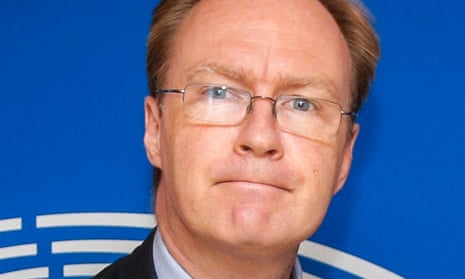A “hardball” EU will seek to avoid a future trade deal with special terms for different sectors of the economy as wanted by Theresa May, says Britain’s former ambassador to the bloc, warning that Brexit talks could get “gory, bitter and twisted”.
Sir Ivan Rogers, who resigned in January complaining of the UK government’s “ill-founded arguments and muddled thinking” and warning it might take 10 years to reach a deal, said leaving the EU without an agreement would be catastrophic because the UK would be in “a legal void”.
Rogers also told the Commons Brexit select committee that the EU was determined to keep trade talks separate from the article 50 divorce agreement, and suggested it could take until this summer “even to agree on what the negotiations should be about”.
Asked whether Angela Merkel, the German chancellor, and other leaders of the 27 EU countries would allow separate deals for sectors such as the car industry, as the prime minister has said she wants, Rogers said they would prioritise the integrity of the single market and customs union.
“The unity of the 27 will win out and I think she and others will agree there will be no sectoral deals in either the single market or the customs union,” he said, adding that he expected this to appear in the EU negotiating mandate.
Rogers said there seemed little prospect of negotiating a trade deal alongside the exit talks, as the prime minister has also said she would like, predicting the question of the UK’s exit bill and continuing contributions would be key.
“The key players, the key officials, the key technocrats, the key theologians” in the EU think a new relationship may not be agreed until 2022 even if negotiations proceed “unprecedentedly fast”, he said.
And before any deal, he warned, for the 27 “the budgetary issue will come to the fore”. The question of Britain’s exit bill and budget contributions during any interim deal would come to a head at a “gory” summit in autumn 2018, he said.
“I think we can expect a number of them to think, if the British want a future trade deal, and some form of transitional arrangement before a future trade deal … it will come together with the money equation,” Rogers said.
“And there will be some who will want to play hardball and say: ‘Well, absent British money over a transitional period, why the hell should we give them any trade deal?”
Rogers said he expected “quite ferocious” legal disputes over the size of the UK’s exit bill and what exactly it was based on. Reports have suggested the EU will ask for a divorce settlement of up to €60bn before opening exit talks.
But he said it would nonetheless be disastrous for the UK to leave the EU without agreement on a trade deal. A “cliff-edge” Brexit would be “insane” and damaging economically for both the EU and Britain, he said – but could happen.
He said the EU had a strong incentive to reach a trade agreement, but its “legalistic” nature meant that if the prime minister stood by her “no deal is better than a bad deal” stance, the UK would be in a legal no man’s land.
“They will say: you have transformed yourselves overnight from being a member of this body to a third country outside the body, and in the absence of a new legal agreement everything falls away,” he said.
“They will say: the day after exit is radically different from the day before. You are now a third country and we don’t have to give you anything … And unless you have a preferential trade agreement, you can’t trade on preferential terms.”
Rogers said that while he was “not accusing anyone of anything”, there was “a danger of solipsistic thinking in London, of people sitting in their own cocoons and saying: ‘Here’s a brilliant wheeze.’”
Britain would do well to realise that “we are up against a class act in the European commission when it comes to negotiating,” he said, with the EU’s trade directorate “one of the top two trade negotiating authorities in the world” alongside the Office of the US Trade Representative.
The trade deal the UK should seek would be “the biggest free trade agreement ever struck, which covers not only goods and tariffs but also services”. He said: “It would be an unprecedentedly good and bespoke deal.”
Even so, it would not be as good as being in the single market, he said: “It is not true that you get everything you want from a free trade agreement and it’s the same as the single market. The crucial difference is between access and membership.”

Comments (…)
Sign in or create your Guardian account to join the discussion